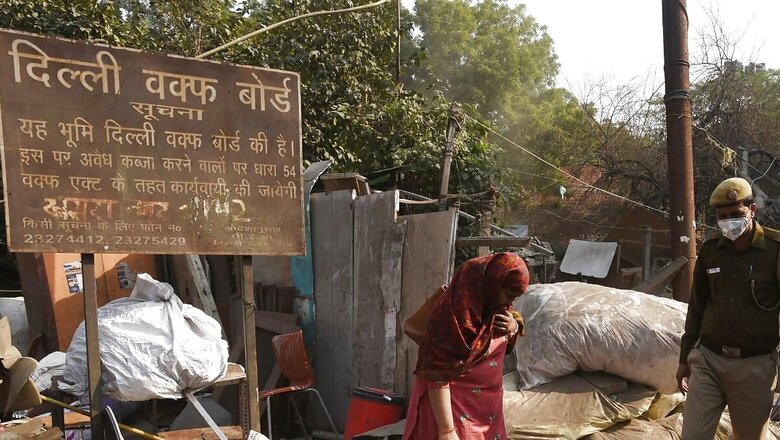
views
In recent days, following the introduction of the Waqf Board Amendment Bill in Parliament on 8 August 2024, there has been considerable debate regarding the necessity of this amendment. The majority of discussions have concentrated on further amending the Act rather than considering its repeal. While state oversight of religious institutions, regardless of faith, is generally viewed as unfavourable, the establishment of a statutory body endowed with extensive powers that supersede state authority is inherently undemocratic.
Consequently, this article will address not only the justification for the Waqf Amendment Bill but also advocate for the complete repeal of the Waqf Board Act, proposing its replacement with a more democratic alternative. I will commence by examining the recent issue of land encroachment by the Waqf Board in Munambam, located in the Ernakulam district of Kerala.
A committee comprising 31 members has been constituted to review the Waqf Amendment Bill 2024. This committee includes 21 representatives from the Lok Sabha and 10 from the Rajya Sabha. On 28 August 2024, the Joint Committee of Parliament (JPC) on the Waqf (Amendment) Bill, 2024, sought input and recommendations from the public, non-governmental organisations, experts, stakeholders, and various institutions. The challenges faced by the residents of Munambam were highlighted in two letters addressed to the Committee by the Public Affairs Commission of the Syro-Malabar Archiepiscopal Church and the Kerala Catholic Bishops’ Council. In these letters, the Church earnestly urged the Government of India to consider the enactment of the new Waqf Board Amendment Bill in light of the difficulties experienced by families in Munambam.
The origins of the Munambam issue can be traced back to the British colonial period. Following the decline of Muziris, Cochin (now Kochi) emerged as the principal trading centre in Kerala, benefiting from its advantageous geographical position, which facilitated trade. The vibrant commerce between Cochin and the Western world was further bolstered by the significant presence of Jewish and Gujarati merchants in the area. In 1902, the ruler of Travancore allocated 404 acres of land and 60 acres of waterbody to Abdul Sathar Musa Haji Seth, a merchant who had relocated to Cochin from Gujarat, solely for agricultural development.
After India gained independence and Travancore-Cochin became part of the Indian Union, Musa Haji Seth’s successor, Sidhique Seth, registered this land under document number 875/1923 at the Sub-Registrar’s Office in Edappally. The land registered to Sidhique Seth included areas traditionally used by the local fishing community. However, on 1 November 1950, this land was transferred to the Management Committee of Farooq College, located in Calicut, Kerala. The title deed explicitly stated that the land was to be used solely for educational purposes, with a provision that it would revert to Sidhique Seth’s family if this condition was not met.
Notably, the term “Waqf” was included in the deed transfer agreement, referring to the permanent dedication of property for purposes recognised by Islamic law as pious, religious, or charitable. This inclusion led to ongoing legal disputes between the management of Farooq College and the local residents.
In 1987, following protracted legal disputes, an agreement was reached between the management of Farooq College and local residents, resulting in the official sale of land to the residents for a substantial sum of Rs 250/- per cent, which was considered exorbitant at the time. Between 1989 and 1993, the Farooq College Management executed and registered over 280 title deeds in favour of the local populace. For more than twenty years, the region experienced no significant issues.
However, in 2022, a resident attempting to pay land tax at the village office was denied the opportunity, as the land in question had been designated as Waqf by the Waqf Board. This incident marked the beginning of a series of grievances against the Waqf Board, culminating in widespread protests and more than five pending cases before the Honourable Court.
The undemocratic principle of “Once a Waqf, always a Waqf” has contributed to the current crisis. This situation is not isolated to Munambam; nationwide, the Waqf Board has asserted claims over numerous properties, positioning itself as the third-largest property owner in the country.
The introduction of the bill to amend the Waqf Board Act by the Central government marks a commendable advancement. The proposed modifications, particularly concerning the establishment of waqfs, are highly encouraging. According to the bill, only individuals who have practised Islam for at least five years are eligible to declare a waqf, and the individual must possess the property being declared. The provision allowing waqf by user has been removed. Additionally, it stipulates that waqf-alal-aulad must not infringe upon the inheritance rights of the donor’s heirs, including female heirs. This is a significant step forward, ensuring that women are not marginalised.
Numerous cases have arisen where government properties were claimed by the Waqf Board, often leading to legal disputes. The bill clarifies that any government property previously identified as waqf will no longer hold that status. In cases of ambiguity regarding ownership, the area collector will determine and report to the state government. The original act limited court intervention in Waqf Board claims; however, the amended bill removes this restriction. Moreover, the bill abolishes the provisions granting finality to the decisions of the Waqf Tribunal, now permitting appeals to the high court within 90 days.
This particular clause, if enacted, could bring significant relief to property owners who currently find themselves vulnerable to Waqf Board claims across India. Not only does this clause enhance the democratic nature of the bill, but it also aligns Islamic regulations with the framework of our constitution.
The residents of Munambam can expect relief once this amendment is implemented. The mandatory online filing of deeds under Waqf, as outlined in the amendment, is expected to enhance transparency in the process. It is crucial that the rule of law is applied uniformly across the country, ensuring that all citizens have equal rights under it. What has occurred in Munambam cannot be viewed as an isolated incident. There may be lakhs of families across the country who are subjected to this act and find themselves fighting legal battles against Waqf boards.
The Government of India must take immediate steps to verify and digitise all Waqf records to prevent future litigations and illegal claims by the Waqf Board, similar to those seen in Munambam.
In a democratic country, there is no place for statutory religious boards. It is high time that the Waqf Act is repealed, and a more equitable legislation introduced to ensure justice for all.
Adarsh Kuniyillam is a Parliamentary and Policy Analyst and has the experience of working under various Members of Parliament. Views expressed in the above piece are personal and solely those of the author. They do not necessarily reflect News18’s views.




















Comments
0 comment